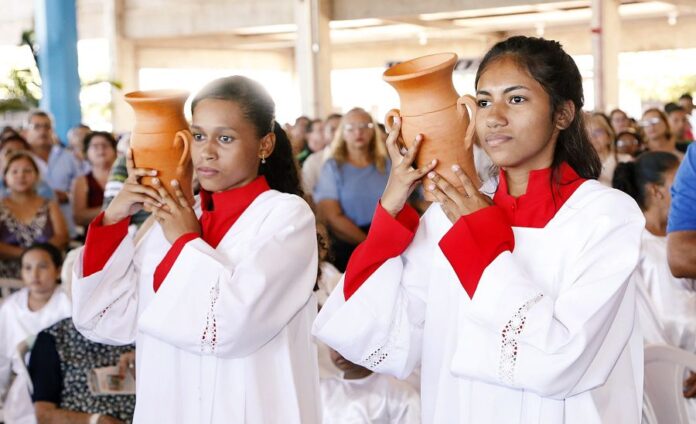(from the Alphonsian Academy blog)
For quite a few people, the question of women is the question of the future of the Church. Some epochal signs may indicate this key. For some people, the Church has long had the face of women. She has that face mainly because, socially, they make up the majority of members in church communities; even when the representative roles in many parts remain in the hands of men, women are the ones who carry out the majority of pastoral activities; their presence is highly significant in pastoral groups and liturgical assemblies.
In more than a few areas, the current pontificate and Synod are a sign of openness to the reality of women. A synodal Church that seeks to move through communion, participation and mission, undoubtedly cannot do without the presence and voice of women. On the contrary, if they constitute the majority of the churches, listening to their voices and having their support seems not to be questioned.
In this sense, it could be said that Pope Francis, with some appointments in certain Vatican offices and services and with the call for a good number of women to be present at this Synod and to have not only the right to speak but also the right to vote (54 women), would be the clearest sign of a Church that widens its table, its structures and its horizons towards a better realisation according to the project of an outgoing Church, according to the project of Jesus.
However, it is also true that we must consider resistance, from the more normal resistance to processes of change to the more pathological resistance that tends to reduce the Church to a rigid and patriarchal pyramid. For this, we must continue to open up possibilities and spaces for participation and commitment, following the dynamics and inspiration of the Spirit, which is what generates changes, transformations, and arouses ministries. The hope is that this synodal process, against all resistance and headwinds, can be a proper space and a profound experience of “listening”, where we continue to give more and more space to new ways of realising the dignity of the baptised and the baptised. A ‘listening’ open to the different clamours of the world and of the Churches themselves. It is about arousing the creative fidelity of a Church that listens, discerns and moves forward in history without fears, cowardice or fearful reservations that tend to immobilise and discard the very dynamic of the Spirit.
Should not the Church, in permanent mission, dare to ask: What functions, tasks and positions will women assume in the Church? What structural limits and blocks of thought must be overcome for the Church to be more communal, fraternal and solidarity? What processes must continue to be opened up so that our Church is not just a museum, as Pope Francis often says, a beautiful but mute Church, with much past, undoubtedly rich, but with little present and future? How do we continue to abandon all kinds of clericalism, patriarchy and masculinism in ecclesial attitudes, structures and systems? How do we not allow ourselves to be overwhelmed by certain disillusionment so as not to dilute prophecy, so as not to continue to carry with us attitudes and structures that not only no longer authentically transmit the faith but continue to oppress and marginalise women?
It is hoped that all this will be an authentic listening, understanding, and dialogue to put God’s will into practice, as Francis said. Even if one expects neither a final document nor decisions on specific issues from this Synod or from this part of the synodal journey, one would expect, in principle, that the synodal experience and procedural mode would open up new avenues regarding the issue of women, awakening consciousness throughout the Church, at all its levels and structures. Their varied presences and voices have been circulating for some time; all that remains is to listen to them, integrate them and generate new styles of ecclesial communion.
In addition to the presence and voices within the Synod, there are many others scattered throughout the large Church who bring tone, light and some serious proposals from their localities so as not to be intimidated by the various resistances to change. It would be suitable and appropriate to ‘listen to them’ to give them a real space in the discernment process. To listen to and integrate women to form with them a varied and rich network of life and ministries. To be a communion Church together, heterogeneous and plural, polyphonic, through borderline, dynamic, pilgrim and changing structures. It would be good to have the courage to initiate creative reconfigurations, new alliances with life, new ecological, plural and symphonic lifestyles, and wise and prophetic services that generate alternatives of life for a more peaceful, worthy and free way.
Fr. Antonio Gerardo Fidalgo CSSR





